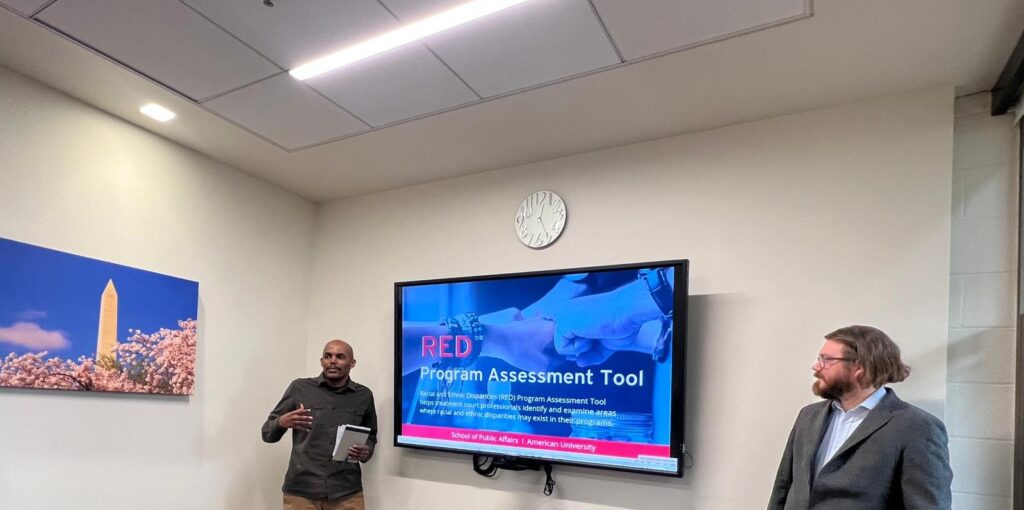
Treatment courts are working and there’s evidence to support it. A drug treatment court is a judicially supervised court docket that provides a sentencing alternative to incarceration for people facing drug charges and who have substance use disorders. Treatment courts support clients through recovery using judicial oversight and evidence-based treatments, reduce the likelihood of participants committing new crimes, and save communities money. However, some treatment courts have experienced racial and ethnic disparities (RED), with minoritized individuals having differential access to programs, as well as completing programs at a lesser rate than their white counterparts.
To assist treatment courts in understanding and examining disparities in their programs, faculty and staff at American University’s (AU) School of Publics Affairs (SPA) along with subject matter experts in the field developed the Racial and Ethnic Disparities (RED) Program Assessment Tool (RED tool). The RED tool is a web-based assessment designed to examine treatment courts’ policies and procedures to determine where racial and ethnic disparities (RED) may exist in programs. It’s been four years since the RED tool was launched. During this time, over 150 treatment courts have completed the assessment.
After completing the RED tool, some treatment courts were trying to figure out the next steps for their court to address equity and inclusion issues. Hearing the need for next steps motivated a team at AU to apply for funding to do a deeper dive with courts on RED issues. In 2022, having heard the same calls from the field, the Bureau of Justice Assistance (BJA) opened a solicitation to fund exactly this type of innovation in programming. The team at AU led by Preeti Menon and Zephi Francis, along with partners at Florida State University, Morgan State University, the University of Central Florida, and Aeon applied for the Field Initiated solicitation and received good news in the fall of 2022.
BJA awarded the team a grant of $1 million over a period of three years to establish the Racial and Ethnic Disparities Initiative (REDI). Through research, policy development, and training and technical assistance (TTA), REDI will work with treatment courts to understand and reduce disparities in their programs.
“When Preeti and I found out that we received the award, we were on campus for the first time together since COVID-19 struck. On that day, we were preparing for an in-person documentary screening and panel discussion on the intersection of substance use, mental health issues, and homelessness,” REDI’s Project Director Zephi Francis said. “We knew that this project was going to be a great opportunity for us to continue the work that we both are passionate about, while advancing BJA’s priority of racial equity.”
With this funding, the REDI team will recruit treatment courts to complete the RED tool, analyze the data, and release guidance on best practices to assist treatment court professionals with decision-making. Another component of REDI entails offering intensive TTA to treatment courts. TTA involves courts participating in multiple virtual sessions with expert faculty to discuss topics identified by the court as priority areas to make their programs more racially and ethnically inclusive. Finally, the REDI team will create online modules for treatment court professionals to learn about best practices and innovative strategies regarding RED.
May is National Treatment Court Month. It’s a time to celebrate all the good work that treatment courts are doing. The REDI team would also encourage treatment courts to use this month as an opportunity to learn more about the RED tool, and take proactive steps to address any disparities in their programs.
